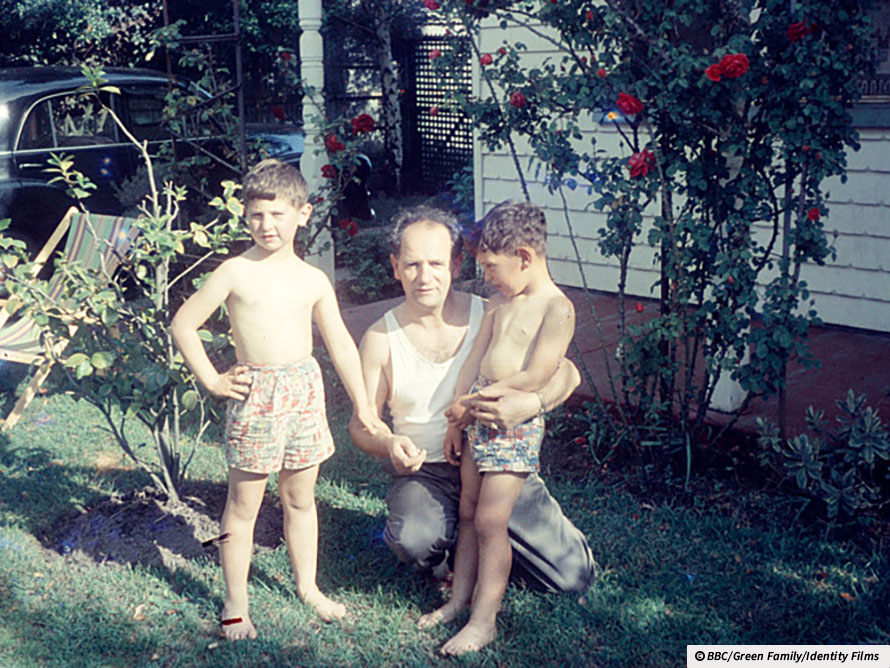Is revenge always wrong? A new film explores an Australian dad’s secret life as a Nazi hunter. Some look down on all acts of revenge. Others think they work when justice fails.
Our dad, Holocaust survivor and Nazi killer
Is revenge always wrong? A new film explores an Australian dad's secret life as a Nazi hunter. Some look down on all acts of revenge. Others think they work when justice fails.
Just desserts
Jack, Jon and Sam Green remember their father Boris as a decent, mild-mannered man.
But Boris had a painful youth. He was a HolocaustThe murder of six million Jewish people in Europe by Nazi Germany. Members of other minority groups were also killed. survivor. After World War TwoA global war that lasted from 1939 to 1945 and included all of the great powers. he had become part of Nakam:1 a JewishRelating or belonging to the religion of Judaism. group fighting back against the NazisA German political party of the twentieth century, led by Adolf Hitler. The Nazis controlled Germany from the early 1930s until the end of World War II.. In 1949, he moved to Australia.
That could have been the end of the story. But a new documentary suggests it was just the end of act one. Revenge: Our Dad the Nazi Killer, released ahead of Holocaust Memorial Day on Saturday, follows the Green brothers as they investigate their own father.
After the war, Australia became a haven for former Nazis fleeing arrest. Revenge sees the Green brothers discover that their father was part of a network of Jews that sought to punish Nazis that had fled down under. He might even have killed some himself.
Revenge has deep roots in our history. The Code of Hammurabi, the oldest recorded set of laws, contains the principle "eye for an eye".2 Many stories encourage us to cheer along as a hero gets revenge, from The Count of Monte Cristo to Gladiator.
Revenge can be dangerous. It differs hugely from justice. Justice is an ideal. It is about treating others fairly and with compassion. Revenge, however, is emotional. It comes from negative feelings like anger and hatred.
It often leads to further wrong actions. In ElizabethanFrom the time of the reign of Queen Elizabeth I of England - 1558 to 1603. plays such as ShakespeareAn English playwright and poet who is often called the greatest writer in the English language. 's Hamlet, one murder sparks a bloody chain reaction.3 We may sympathiseTo understand the feelings of another and support them. with Hamlet. But his actions lead to even more senseless pain.
Yet there might be some situations where revenge is warrantedJustified or called for. . Journalist Jonathan Freedland writes: "The dirty little secret of the Holocaust... is that no one was punished for it." The Nazi leadership was executed. But countless others escaped punishment. In the face of an unspeakable crime, can revenge be justified when justice fails?
Is revenge always wrong?
Yes: Two wrongs don't make a right. But one wrong often leads to another, then another, then another. Revenge drags everyone into the mud. We should turn the other cheek and trust in justice.
No: Fear is one of the things that makes us human. And fear of revenge keeps society in line. The prospect of facing revenge for a crime might stop us committing that crime in the first place.
Or... Revenge itself is neither right nor wrong. It is born out of our emotions. Most people will want revenge at one point or another. The wrong comes when we hurt others by acting on this desire.
Keywords
Holocaust - The murder of six million Jewish people in Europe by Nazi Germany. Members of other minority groups were also killed.
World War Two - A global war that lasted from 1939 to 1945 and included all of the great powers.
Jewish - Relating or belonging to the religion of Judaism.
Nazis - A German political party of the twentieth century, led by Adolf Hitler. The Nazis controlled Germany from the early 1930s until the end of World War II.
Elizabethan - From the time of the reign of Queen Elizabeth I of England - 1558 to 1603.
Shakespeare - An English playwright and poet who is often called the greatest writer in the English language.
Sympathise - To understand the feelings of another and support them.
Warranted - Justified or called for.
Our dad, Holocaust survivor and Nazi killer
 Two face: Modest family man Boris Green may have been a fearsome Nazi hunter.
Two face: Modest family man Boris Green may have been a fearsome Nazi hunter. Glossary
Holocaust - The murder of six million Jewish people in Europe by Nazi Germany. Members of other minority groups were also killed.
World War Two - A global war that lasted from 1939 to 1945 and included all of the great powers.
Jewish - Relating or belonging to the religion of Judaism.
Nazis - A German political party of the twentieth century, led by Adolf Hitler. The Nazis controlled Germany from the early 1930s until the end of World War II.
Elizabethan - From the time of the reign of Queen Elizabeth I of England — 1558 to 1603.
Shakespeare - An English playwright and poet who is often called the greatest writer in the English language.
Sympathise - To understand the feelings of another and support them.
Warranted - Justified or called for.
